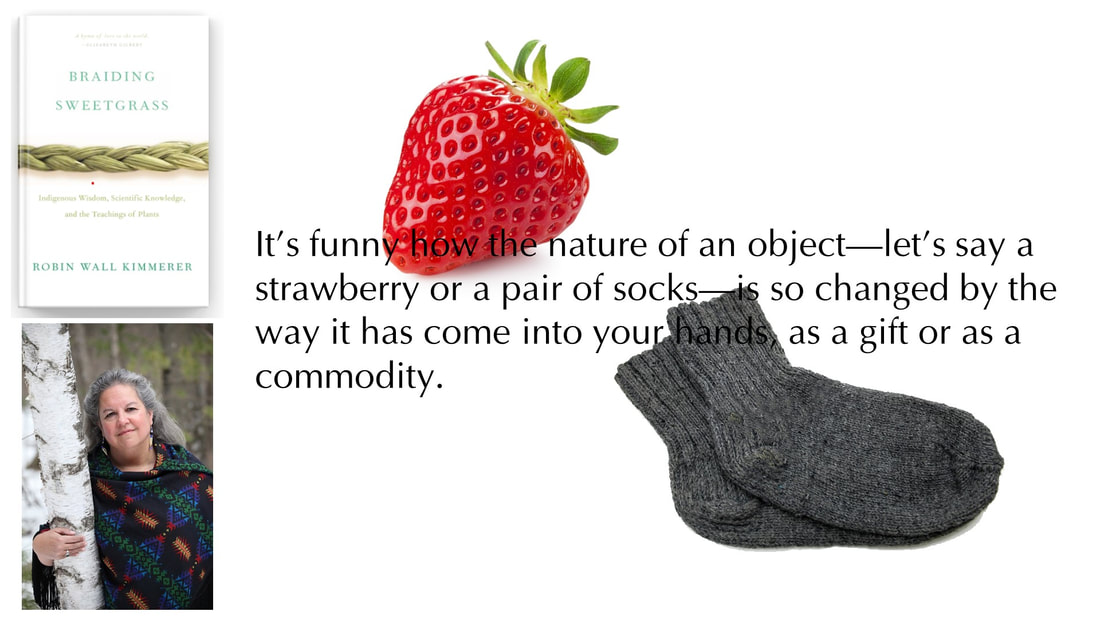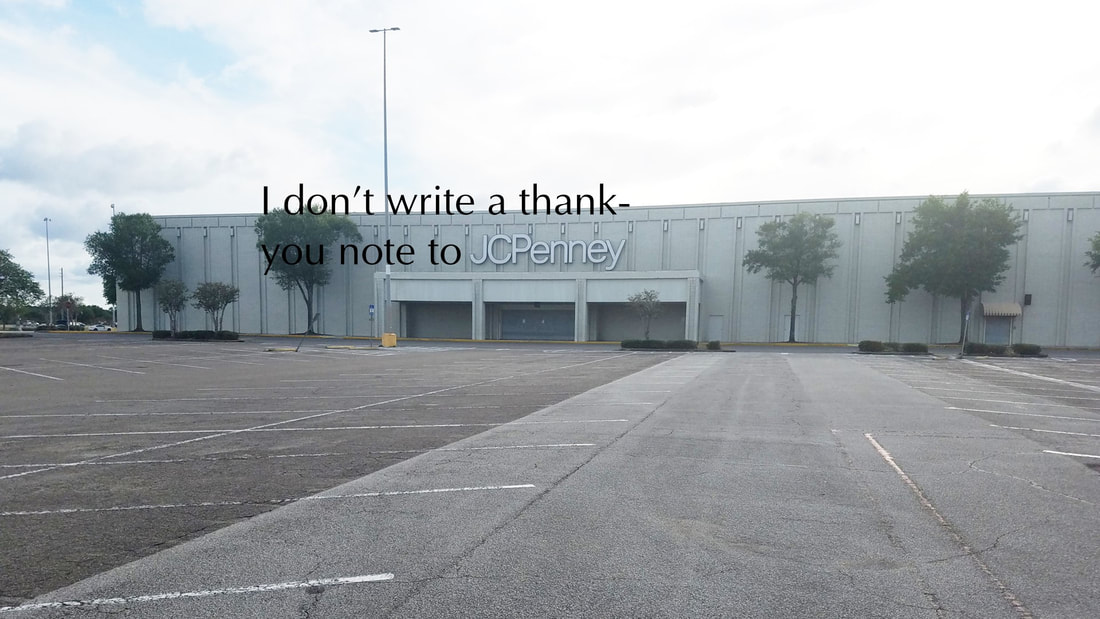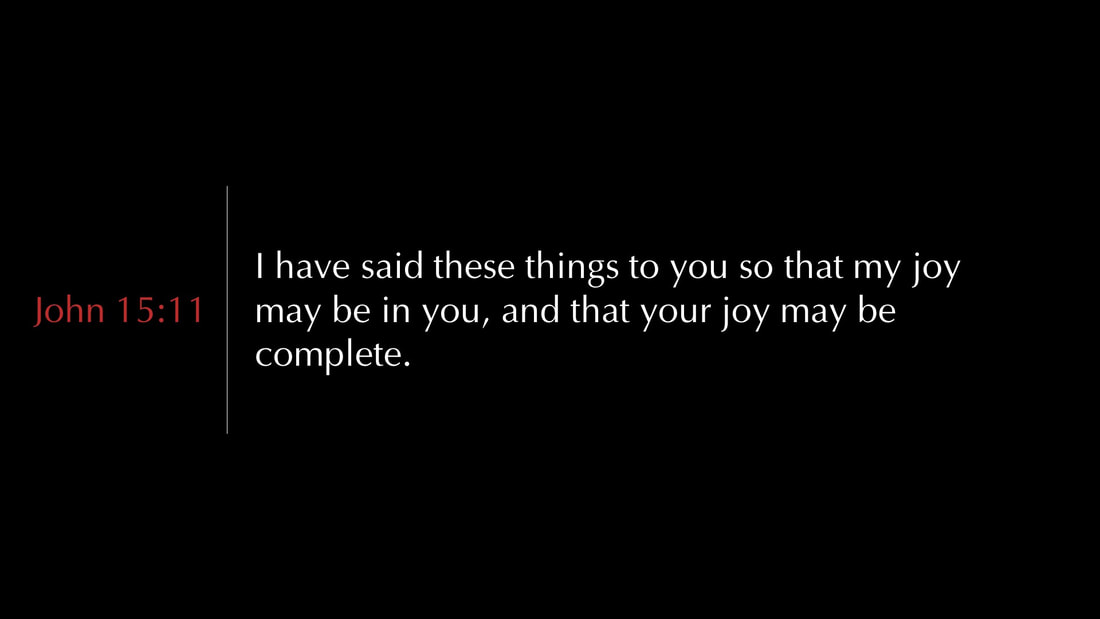Scott Anderson Acts 10:44-48 † Psalm 98 † 1 John 5:1-6 † John 15:9-17 A video version of this sermon can be found here. You likely read the quote from the Robin Wall Kimmerer we included in the invitation to worship. Here it is again, from her book Braiding Sweetgrass: “It’s funny,” she writes, “how the nature of an object—let’s say a strawberry or a pair of socks—is so changed by the way it has come into your hands, as a gift or as a commodity. The pair of wool socks that I buy at the store, red and gray striped, are warm and cozy. I might feel grateful for the sheep that made the wool and the worker who ran the knitting machine. I hope so. But I have no inherent obligation to those socks as a commodity, as private property. There is no bond beyond the politely exchanged “thank yous” with the clerk. I have paid for them and our reciprocity ended the minute I handed her the money. The exchange ends once parity has been established, an equal exchange. They become my property. I don’t write a thank-you note to JCPenney.[i] Gifts, she explains, create ongoing relationships. Were those same socks knitted by her grandmother and given as a gift, she would not only write a thank-you note, but take care of them, wear them when she visits, even if she didn’t like them. She would make her a gift in return on her birthday. “That is the fundamental nature of gifts: they move, and their value increases with their passage.” I was thinking about strawberries this week. Like Kimmerer, my mom tells stories about picking strawberries as a kid. As I remember, it was something she did for some pay, to pick up a little extra money to help out her family who knew what it was to be in want. But I think there was a joy there too that resonates with the distinction Kimmerer is trying to make for us. Kimmerer remembers that strawberries first shaped her experience of a world “full of gifts simply scattered at your feet.”[ii] These gifts move toward you through no action of your own. You can’t earn it. You can’t call it to you. You can never deserve it. The only choice you make is to be open-eyed and present. She remembers joy-filled days in these giving fields, lifting up small leaves low to the ground to discover small, flavor-filled wild strawberries freely offered. Those fields of my childhood showered us with strawberries, raspberries, blackberries, hickory nuts in the fall, bouquets of wildflowers brought to my mom, and family walks on Sunday afternoon. They were our playground, retreat, wildlife sanctuary, ecology classroom, and the place where we learned to shoot tin cans off the stone wall. All for free. Or so I thought. I experienced the world in that time as a gift economy, “goods and services” not purchased but received as gifts from the earth. Of course I was blissfully unaware of how my parents must have struggled to make ends meet in the wage economy raging far from this field.[iii] Kimmerer’s father loved strawberries, so Father’s Day would almost always be celebrated with strawberry shortcake. Her mom would do the baking and the kids were responsible for the berries. They would spend a Saturday gathering berries, more going in their mouths than anywhere, but they would return home triumphant, with jars full, then poured out on the kitchen table to sort out the bugs. “I’m sure we missed some,” she remembers, “but Dad never mentioned the extra protein.”[iv] That is the fundamental nature of gifts: they move, and their value increases with their passage. The fields made a gift of berries to us and we made a gift of them to our father. The more something is shared, the greater its value becomes.[v] Jesus says to his disciples, “I no longer call you servants, but friends.” I think that friendship, especially as we see it here in these texts is a gift in precisely the way Kimmerer means it. It is empowering to be called a friend and not a servant. And if you are a friend, you are acting out of love. You are doing the work out of love. If you are a friend, you have been chosen as a partner. But don’t forget those socks. This gift does not come free. Kimmerer looks to the scholar Lewis Hyde: “It is the cardinal difference between gift and commodity exchange that a gift establishes a feeling-bond between two people.”[vi] That’s essentially the difference between a gift economy and a wage economy—between the form of relationships Jesus invites we disciples into and the economy of the Western, industrialized, white world—those economies of the colonizers that smothered the gift economies that characterized indigenous life and wisdom on this continent for thousands of years. Kimmerer looks to Lewis Hyde for clarity in his exploration of the pejorative “Indian giver.” I am glad to not have come across this ugly term for many years, but I knew of it as a white child growing in relative privilege to describe someone who gives something and then wants it back. In truth, it is a story of cross-cultural misinterpretation between an indigenous culture operating in a gift economy and a colonial culture steeped in the concept of private property. When settlers received gifts from Native inhabitants, the white recipients understood them as valuable, and thus, intended to be retained. To give them away would be an afront in the same way you would give away those socks your grandmother lovingly knitted for you. But those indigenous people who lived in the context of a gift economy based on reciprocity. It was equally an afront if the gifts did not circulate back to them. “Many of our ancient teachings,” Kimmerer explains, “counsel that whatever we have been given is supposed to be given away again.”[vii] This should not be an unfamiliar concept to us with just a glancing view at today’s texts: First John five: “For the love of God is this, that we obey his commandments.”[viii] John 15: “You did not choose me but” like those strawberries scattered in the field, “I chose you. And I appointed you to go and bear fruit that will last…”[ix] “From the viewpoint of a private property economy,” Kimmerer explains, “the ‘gift’ is deemed to be ‘free’ because we obtain it free of charge, at no cost.” It then becomes easy for me to imagine it is mine without obligation to do whatever I want to with it. But in the gift economy, gifts are not free. The essence of the gift is that it creates a set of relationships. The currency of a gift economy is, at its root, reciprocity. In Western thinking, private land is understood to be a “bundle of rights,” whereas in a gift economy property has a “bundle of responsibilities” attached.[x] Perhaps there is not better day in our Western World than Mother’s Day to illustrate that love always comes with obligation, and at its best, joyful obligation. There is nothing we would rather do within the context of our most deeply bonded relationships than give back and bless. Our human relationships are transformed by our choice of perspective. Their values increase as we enter into more deeply into the invitation of Gospel; our joy is made complete.[xi] Now, Kimmerer is not just speaking poetically in all of this, nor are these scriptures. Kimmerer is also a plant scientist, and she understands these realities in the context of adaptive, evolutionary behavior. Those little strawberry plants she remembers from her childhood were not really up all night cooking up a batch of strawberries for her, but they were in fact “up all night assembling little packets of sugar and seeds and fragrance and color,” because when they do so, “their evolutionary fitness is increased.” When it is successful in enticing an animal such as me to disperse its fruit, its genes for making yumminess are passed on to ensuing generations with a higher frequency than those of the plant whose berries were inferior. The berries made by the plant shape the behaviors of the dispersers and have adaptive consequences.[xii] Just so, our behaviors are adaptive. Our choice of perception that makes the world a gift is adaptive. Our refusal to participate when someone tries to sell the gifts is one way that we might find our joy is made complete. So, for example: Water is a gift for all. It is not meant to be bought or sold. Don’t buy it. There is something wrong with food that has come to us devoid of any connection to the animals that gave their lives for it. But we can find our way back. Kimmerer one last time: The market economy story has spread like wildfire, with uneven results for human well-being and devastation for the natural world. But it is just a story we have told ourselves and we are free to tell another, to reclaim the old one.[xiii] Thanks be to God. Notes:
[i] Kimmerer, Robin Wall. Braiding Sweetgrass (p. 26). Milkweed Editions. Kindle Edition. [ii] Ibid., 23. [iii] Ibid., 24. [iv] Ibid. [v] Ibid., 27. [vi] Ibid., 26. [vii] Ibid., 28. [viii] 1 John 5:3-4. [ix] John 15:16. [x] Kimmerer, Robin Wall. Braiding Sweetgrass (p. 28). Milkweed Editions. Kindle Edition. [xi] Cf. John 15:11. [xii] Kimmerer, Robin Wall. Braiding Sweetgrass (p. 30). Milkweed Editions. Kindle Edition. [xiii] Ibid., 31.
1 Comment
5/31/2023 11:14:19 pm
When you do business with MarketPro Homebuyers, you know you are working with a company who has your best interests at heart. MarketPro is a name you can trust, as we are the #1 cash home buyer in Maryland, DC, Virginia, and Pennsylvania.
Reply
Leave a Reply. |
St. Andrew SermonsCategories
All
|



 RSS Feed
RSS Feed